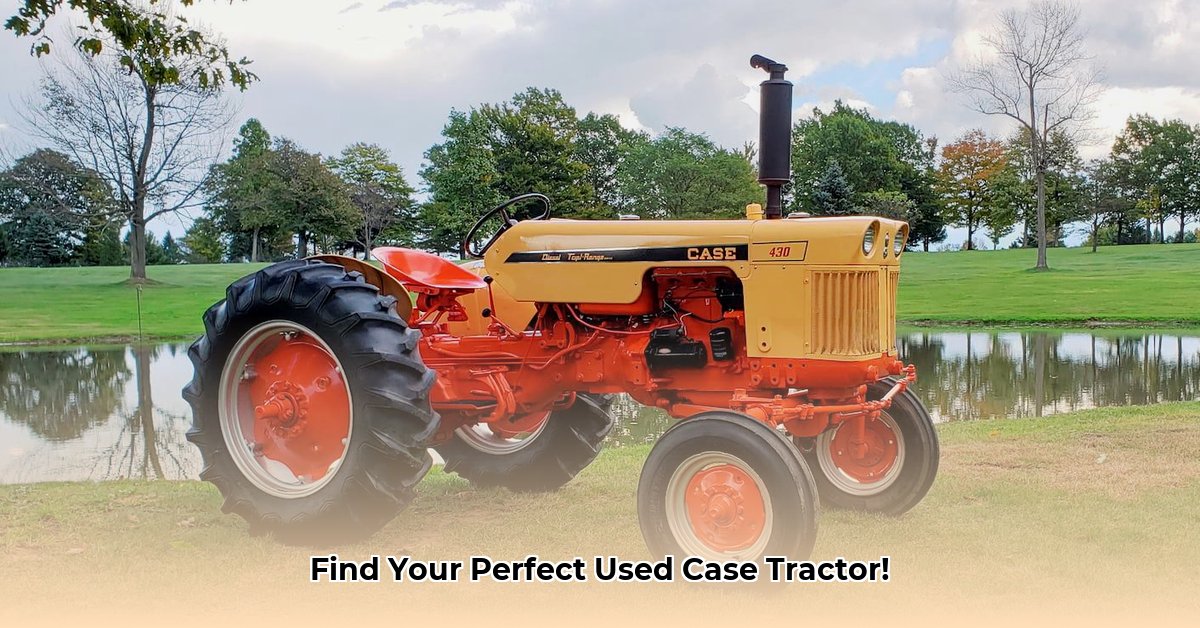
Finding the right used J.I. Case tractor can save you significant money, but navigating this market requires careful planning and due diligence. This guide offers a step-by-step approach to help you find the perfect machine without overspending or encountering unforeseen problems. For similar options, consider exploring other brands like John Deere; check out used John Deere tractors.
Understanding J.I. Case Tractor Models: Finding the Right Fit
J.I. Case produces a diverse range of tractors, each suited to different needs and budgets. Understanding your specific requirements is the first step. Consider the size of your property, the types of tasks you'll perform (plowing, haying, etc.), and your budget. Horsepower is critical; higher horsepower translates to greater power and capabilities but also higher costs.
Here's a simplified overview of common horsepower ranges and their typical applications:
| Horsepower Range | Typical Features | Best Suited For |
|---|---|---|
| Under 40 HP | Basic hydraulics, rear PTO | Small farms, hobby farms, landowners |
| 40-100 HP | Enhanced hydraulics, possibly MFWD (front-wheel drive), optional loader | Medium-sized farms, livestock farms |
| 100-174 HP | Advanced hydraulics, MFWD, multiple PTO options, more advanced features | Large farms, commercial operations |
Remember that price is significantly influenced by the tractor's condition and age. A well-maintained, low-hour tractor will command a higher price than one with significant wear and tear. Have you considered the potential resale value for your investment?
Assessing Tractor Condition: A Practical Inspection Guide
A thorough inspection is paramount. Don't rely solely on photographs; a hands-on examination is essential. Don't feel rushed; carefully check every aspect of the tractor. Is this your first time buying a used tractor?
Step 1: Visual Inspection: Start with a visual assessment. Look for rust, dents, and significant scratches, indicating potential structural damage. Examine the tires for wear and tear; uneven wear may signal underlying mechanical issues.
Step 2: Engine Check: Start the engine and listen carefully for unusual noises – knocking, squealing, or rattling. These sounds can indicate problems with the engine's internal components. Check all fluids (oil, coolant, transmission fluid); low levels or discolored fluid suggest potential leaks or other issues.
Step 3: Hydraulic System Test: Thoroughly test all hydraulic functions. Look for smooth, controlled movements when raising and lowering attachments. Any jerking or sluggishness signifies potential problems with the hydraulic system.
Step 4: PTO functionality: Engage and disengage the PTO (Power Take-Off) to ensure smooth operation. A faulty PTO can significantly impact the tractor's functionality.
Step 5: Professional Inspection: Hiring a qualified mechanic for a pre-purchase inspection is highly recommended, especially for expensive purchases. This expense is often a small price to pay in order to avoid costly repairs.
Pricing and Negotiation: Strategies for Success
Pricing for used J.I. Case tractors varies significantly. Several factors influence price: horsepower, age, condition, hours of use, modifications, and auction type.
- Online Marketplaces: Online listings offer extensive choices but require careful scrutiny of photos and descriptions.
- Auctions: Auctions can be competitive but potentially yield lower prices. Online auctions offer convenience, but in-person auctions allow for a hands-on inspection.
- Private Sales: Private sellers might offer more flexible pricing but require thorough due diligence.
Before negotiating, research comparable tractors to determine fair market value. Websites such as TractorHouse and Machinery Pete offer valuable resources for market research. Don’t hesitate to walk away from a deal if the price or condition is unsatisfactory.
Finding the Right Tractor: Effective Search Strategies
Several avenues exist for finding your ideal tractor:
- Online Marketplaces: Use specialized online marketplaces to broaden your search.
- Local Dealerships: Local dealerships often have a selection of used tractors and may offer warranties.
- Farm Auctions: Auctions can provide bargains, but thorough pre-auction inspection is crucial.
Always verify the seller's reputation whenever possible. Look for feedback and reviews. Don't be afraid to ask questions; a reputable seller will be transparent and forthcoming.
Financing and Legal Considerations: Protecting Your Investment
Securing financing might be necessary. Compare interest rates and terms from different lenders to find the most favorable option. Thoroughly review all loan documents before signing.
Legal aspects are crucial. Ensure proper title transfer and understand any existing warranties. Obtain all necessary paperwork to avoid future legal complications.
Mitigating Risk: Key Takeaways
Buying a used tractor involves inherent risks. These strategies can help mitigate those risks:
| Risk | Mitigation Strategy |
|---|---|
| Major Mechanical Problems | Thorough pre-purchase inspection by a qualified mechanic |
| Paying Too Much | Research market prices and negotiate effectively |
| Dealing with Scammers | Use reputable sources and verify seller information |
| Difficulty Finding Parts | Check the availability of parts for the specific model |
Buying a used J.I. Case tractor can be financially rewarding, providing years of reliable service. Remember that thorough research, a careful inspection, and effective negotiation are essential for a successful purchase.